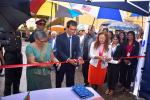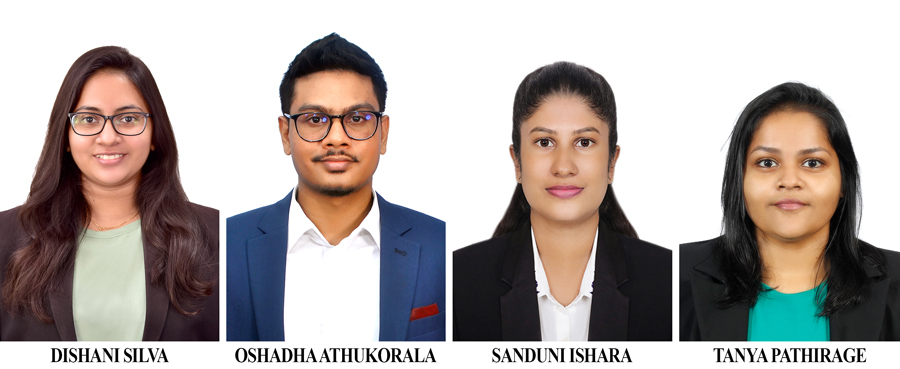The paper titled ‘Alcohol brings burdens : A global and continent wise study on alcohol consumption and global burden of diseases was a collaboration between SLIIT students Oshada Athukorala, Sanduni Ishara, Dishani Silva, and Tanya Pathirage.
In conversation with the students, they discuss their research journey and publication success.
Why was the specific area/topic selected?
We found high Scimago H-index articles which were related to our research area, but no research was conducted continent-wise.
We also noted that alcohol consumption has a variety of wine, beer, spirit and other alcoholic beverages because no in-depth research study related to our topic was available.
Accordingly, we decided to conduct our research study for each type of consumption-related burden of diseases for continent price.
We also considered our independent variables such as socio-demographic environment, human development index and income because no research studies to date have been conducted using all these variables together.
How long was the research conducted?
The research was completed in almost six months, within the first semester of the final year, February to June. We believe it was an achievement having done the research within a six-month period whilst the whole assignment was for a 12-month period.
How did you achieve such a significant achievement before graduating?
Completing the research in a six-month period with a good quality publication was not easy.
However, there were many who supported us, by providing guidance and knowledge enabling us to complete such a mammoth undertaking.
Some key people supported and guided us.
Among them is our supervisor, Prof. Ruwan Jayathilaka, Associate Professor, SLIIT Business School.
From the first moment, we were very keen to choose, Prof. Ruwan Jayathilaka as our supervisor, because of his reputation for research and his innovative thinking.
The motivation he has given us throughout the research step by step was immeasurable.
During our research, Prof. Ruwan Jayathilaka continuously guided and supported us.
He provided examples, of past studies and showcased past achievements of alumni, sharing his experience.
Additionally, his lectures are very interesting and exciting, spurring us further.
Completing the research in six months with a quality journal publication was very hard, as four of us are from different districts and also from different areas.
There were barriers to communicating physically and conducting physical meetings.
However, all our team members worked very hard to complete the research.
The team sacrificed their time and prioritized the research which contributed to making this achievement possible.
Undertaking the research during economic hardships was very stressful.
We should mention our parents for their understanding and for giving us the strength to overcome challenges.
How did SLIIT support you throughout your research?
SLIIT's online and offline resources are excellent, and they helped us achieve this goal.
Having a team at the Institute to assist us was critical, as some of our team members work in corporate firms.
SLIIT Business School lecturers and staff members were extremely helpful.
We would also like to thank the lecturers and non-academic staff at SLIIT for their guidance and assistance in making the journey easier.
We are grateful to the Chancellor, Vice-Chancellor and the Deputy Vice-Chancellor of SLIIT and also the Dean of the SLIIT Business School, Prof. Samantha Thelijjagoda for giving us the opportunity to conduct the research.
Has the research been accepted for publication?
Yes, our research has been accepted by a journal where the H-Index was 367 with the Q1 category in SJR. The Journal is PLOS ONE, among the top ten ranks in Scopus and currently maintains less than 10% acceptance rate for the research papers.
Can you elaborate on the research process?
Firstly, we had to find a good research issue.
All the guidance and steps needed were given by our supervisor, as well as selecting a good research topic, we then completed the proposal, and the literature, collected data, undertook the analysis and wrote the results and then finalised our research article.
What are your future plans?
We are planning to write more papers to fulfil the remaining objectives of our thesis.
We hope to further research the study area with more new variables.
The main goal for the next four months is complete the objectives of the paper before our graduation.
The journal paper will also be of great support and guidance towards our career path as well as contribute to academia.
Prof. Ruwan Jayathilaka, Associate Professor, SLIIT Business School, as Supervisor for the Paper shares his views on the importance of H-index rankings and Students’ achievement.
In your view how important it is for students to achieve H-Index ranking status?
The publication is a common method scholars use to demonstrate academic talent.
Quality publication of research brings attention to scholars and their institutions.
This in turn may bring in more funding for the institute and also ensure an individual's progress in their field.
A higher h-index of a publication reveals the importance, visibility, and real dissemination of your work to a wider audience.
Early publications serve as a catalyst for scientific and academic skills development and signal the ability of future scientists to develop research and produce a solid set of research outputs.
Besides employment opportunities, the publication rapport of scientists throughout their careers is associated with both research grants and career success.
Having high H-index publications in students’ early academic carrier can act as signals, adding value to individuals and their work, and thus enhancing their visibility when searching for positions either in or out of academia.
This possibly warrants positive effects on their employability, which brings benefits to them and the university where they developed their studies.
Furthermore, for research-related scholarships or jobs, it is necessary to have some quality papers published as it will indicate that you have a bit of experience and things won't be hard for you. As a matter of fact, it gives you more credit in your future.
How did you guide the students towards this accomplishment?
This is a continuous process of guidance with clear direction for the student’s work.
First, this involves encouraging, mentoring, and being aware that students’ lives extend beyond the BBA in a real-life context.
Setting expectations early in the dissertation, being flexible, planning the process and managing time spent on supervision is part of that.
Second, to communicate well with students and peers and employ the advantage of utilising resources provided by SLIIT.
Moreover, providing feedback and criticism of their work that is constructive and prompt are crucial to the growth of a student.
For example, I meet students regularly, set aside adequate time for students, and be contactable through several media (e.g., email, phone, zoom) – mainly if they are not physically present.
Students do not necessarily expect the supervisor to have expertise in the precise topic of their research; they highly value a supervisor who can guide them to apply their knowledge of the subject area to conceptualize and demonstrate how the student’s research topic fits within the broader field.
However, having the guidance of a supervisor with expertise in the research methodologies required in the study is particularly important and advantageous in equipping new researchers with skills and producing quality research papers.
In your view how impactful is the selected topic?
This study investigates the long-term relationship between global alcohol consumption and the global burden of diseases between the years 2000 and 2019 continent-wise and globally.
This study had been conducted due to two specific reasons.
First, this research study covers 177 countries worldwide including all five continents using recent data collected over the past 20 years.
Hence, the study is comprehensive (wide coverage of countries and to the best of the researcher’s knowledge, so far studies have not focussed on this topic under the variables selected in the present study) and timely.
In addition, a separate analysis is conducted for each continent with the global level analysis which further enhances the significance of the study.
The second reason is that the variables selected for the analysis are unique compared to those considered in previous studies.
In contrast, education, poverty and other major measurements which count the level of human development were considered variables in prior studies.
The findings demonstrate the overall picture of the impact of alcohol consumption and other variables on the global burden of diseases and provide suggestions on how these variables should be tackled in the future to reduce the global burden of diseases.
Prof. Samantha Thelijjagoda - Dean of SLIIT Business School
“Research is fundamental to our purpose.
SLIIT’s continued success in international research rankings is a testament to the sustained commitment of our staff to pursuing excellence in all of our research activities and should be commended.
The team’s achievement also demonstrates the high quality of academic work that our students produce.
The H-index result achieved by the group of students is just one indicator of how research has come to the fore at SLIIT in recent years, as we deliver increasing impact on the global stage.”
The Research paper https://doi.org/10.1371/journal.pone.0270998
























